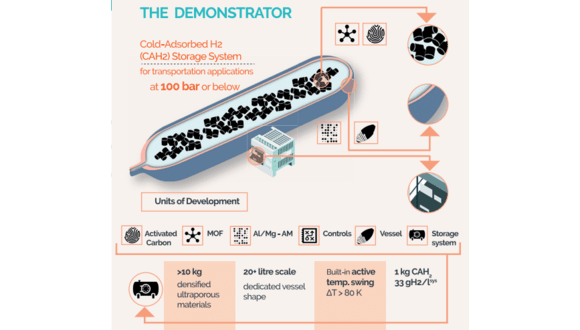Wed, 02 November, 2022
A new website has launched for the MAST3RBoost project, of which TWI is a partner.
The project aims to deliver improved hydrogen storage solutions to help progress what many see as the most environmentally-friendly answer to clean transport.
The transport sector accounts for around one-third of all CO2 emissions across the European Union, making the decarbonisation of transport a key part of an energy transition to a cleaner environment.
Hydrogen fuel cells have been shown to outperform batteries and are a cleaner solution for the decarbonisation of buses, large cars, ships, trucks, and trains, since they do not have the same problems with manufacture and disposal.
Commercial vehicles are a good target for the early adoption of hydrogen fuel-based decarbonisation but there are still challenges to be overcome related to on-board hydrogen storage for vehicles.
The goal of the industry is to achieve hydrogen compression and storage to allow 5kg of H2 to be stored in a gasoline equivalent tank (80kg/90l).
Currently, H2 storage based on a 700bar compression still lacks the required volumetric density to allow the widespread adoption of hydrogen fuel cell vehicles.
TWI has joined 12 other organisations on the MAST3RBoost Project (‘Maturing the production standards of ultraporous structures for high density hydrogen storage bank operating on swinging temperatures and low compression’), to bring a new generation of ultraporous materials for high-density hydrogen storage to maturity.
 (MAST3RBoost Consortium Partners)
(MAST3RBoost Consortium Partners)
This new generation of ultraporous materials, such as activated carbons (ACs) and high density metal-organic frameworks (MOFs), have been improved with machine learning techniques to create a disruptive path to meet industry goals for an adsorption-based hydrogen storage demonstrator at the kg-scale.
Using innovative wire-arc additive manufacturing techniques will allow the materials to be embedded with dedicated shapes designed to better fit specific on-board vehicle transportation spaces.
Further adding to the environmental benefits, the project will investigate the use of raw materials from agroforestry biomass and solid urban waste for the manufacture of the ultraporous materials.
In addition, the R&D process will use the application of life cycle thinking strategies to minimise environmental impacts, while still improving economic performance from the design phase on.
Project Tasks
The project is due to run for 48-months, and will include:
- Machine learning for unsupervised algorithms
- Densification and scale up of materials
- Digital twin of system to aid numerical calculations
- System qualification and integration
- Eco-friendly storage system design
 (MAST3RBoost Cold-Adsorbed H2 (CAH2) Storage System Demonstrator)
(MAST3RBoost Cold-Adsorbed H2 (CAH2) Storage System Demonstrator)
Objectives and Aims
Creating a demonstrator will require a number of project objectives to be met:
- Standards for the repeatable and scaleable production of ultraporous materials with specific profiles
- Prototyping of materials examples from MOF and carbon families
- Delivery of data management systems for high throughput machine learning to allow for the fast development of hydrogen storage materials
- Developing a wire arc additive manufacturing process for materials able to cope with required cryogenic temperatures and chemicals
- Creation of a pressure vessel to store 1kg of H2 at 100bar
- Qualification of high density storage system
- Knowledge transfer
- Discussion and training for value chain including end users
- Promotion to allow for further innovation
The state-of-the-art hydrogen testing facilities at TWI will be used as part of this project, where we are able to quantify hydrogen permeation rates.
The project aim is to develop lab-scale synthesis protocols into an industry-ready manufacturing process and demonstrator that embodies a technical and economically feasible solution for hydrogen transportation storage in excess of 60kg.
This will provide a step change in hydrogen fuel solutions for aerospace, rail and large road transport.
You can find out more about the MAST3RBoost project on the dedicated project website, here.
This project has received funding from the European Union’s Horizon Europe's research and innovation programme under grant agreement No 101058574. TWI's work in this project is funded by Innovate UK under grant no 10040807.